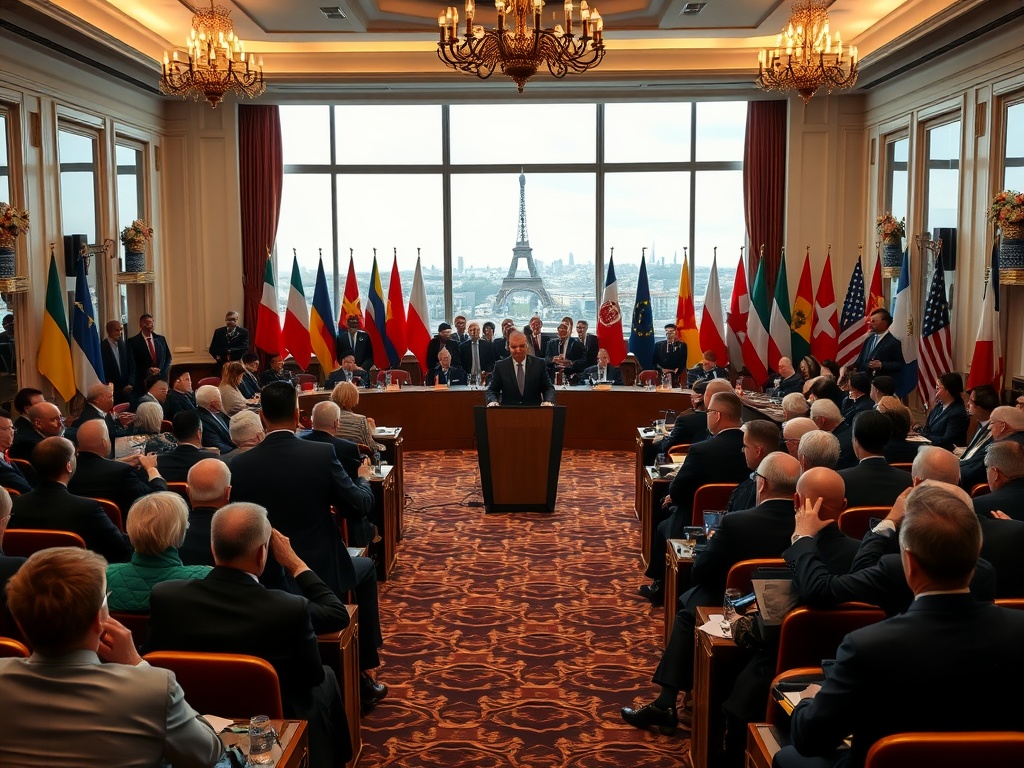Starmer to Advocate for Increased Defence Spending in Paris Summit
Sir Keir Starmer is gearing up to challenge the Chancellor’s position and advocate for augmented defence spending as he prepares for an emergency summit with European leaders in Paris. This urgent meeting, convened by President Emmanuel Macron of France, arises from escalating concerns that European nations are being overlooked in discussions regarding the future of Ukraine, with the US and Russia engaging in direct talks.
According to reports from The Times, Starmer plans to override Rachel Reeves, the Chancellor, in pushing for a more substantial military budget. This initiative aims to solidify relations with Washington, especially in light of his forthcoming discussions with President Donald Trump. While Downing Street has reiterated its commitment to increasing military expenditure to 2.5% of GDP, no specific timeline has been provided for achieving this goal. However, senior defence officials are advocating for a bolder target of 2.65%, which could potentially add an estimated £10 billion to government spending. This increase would place additional pressure on Reeves’ overall economic strategy.
Potential Areas for Future Cuts
With the pressing need for increased military funding, here are the areas where Chancellor Reeves may have to consider reductions to balance the budget:
1. Cutting Benefit Spending
The Labour government is moving forward with initiatives set forth by the previous administration aimed at drastically reducing the benefits expenditure, which is projected to soar to £100 billion annually by 2030 if current trends continue. Work and Pensions Secretary Liz Kendall has previously stated that the health and disability benefits framework is “broken” and is preparing to unveil a series of “radical” reforms later this year.
Significant changes are anticipated for the Work Capability Assessment (WCA), which determines individuals’ fitness to work and their eligibility for universal credit or employment and support allowance (ESA). Tightening the eligibility criteria could displace hundreds of thousands of individuals from the “limited capability for work and work-related activity” category into the job-search category, resulting in each individual losing approximately £417 per month, equating to around £5,000 annually.
2. Squeezing Public Sector Pay

In light of rising borrowing costs, Reeves may need to adopt a more stringent approach to public sector pay negotiations while trying to maintain fiscal balance. Public sector salaries constitute one of the largest financial burdens on the public purse, accounting for £240 billion in 2022, nearly 10% of the UK’s GDP and about one-fifth of the Treasury’s total expenditure.
This situation could lead to conflicts with unions, many of which are advocating for significant pay increases for their members to compensate for perceived years of stagnation. Unions have already indicated the possibility of future industrial action after the Government proposed a mere 2.8% pay rise for NHS personnel and other public sector workers for the coming year.
3. Cuts to Unprotected Departments
The Chancellor is reportedly contemplating deeper cuts to departmental spending than initially anticipated, although vital sectors like the NHS are expected to remain insulated from reductions. “Fixing” the NHS was a significant pledge in the party’s election manifesto, limiting flexibility in this area. It is anticipated that reductions will impact “unprotected” departments, including the Home Office, Ministry of Justice, and the Ministry of Housing, Communities, and Local Government.
One possible strategy could involve an across-the-board efficiency review, compelling each department to implement minor percentage cuts to their budgets. It is widely expected that the Treasury will require departments to achieve efficiency savings amounting to five percent of their budgets.
4. Rewriting Fiscal Rules
The surge in bond yields at the beginning of the year has diminished much of the fiscal leeway that Reeves had initially outlined last October, complicating her plans to “fix the foundations” of the economy. There is speculation that the Chancellor might respond by altering or postponing existing fiscal rules, such as the commitment to reducing debt as a share of national income by the end of this parliamentary term. However, such a move could undermine market confidence, potentially triggering a further sell-off in UK bonds and exacerbating borrowing conditions.
5. Raising Taxes
While the Government has publicly dismissed the idea of major tax hikes, experts suggest that Reeves may still need to explore avenues for increasing revenue. Any tax increase would likely face significant public backlash, as the UK is already grappling with historically high tax levels, with the tax burden expected to reach 38.3% of GDP by 2027-28.
Options for raising revenue could include increasing capital gains tax, hiking alcohol and tobacco duties, or expanding VAT to currently exempt goods and services. Additionally, reducing tax relief on pension contributions for high earners and eliminating the lifetime ISA are potential strategies. A politically sensitive move would be to extend the freeze on income tax thresholds beyond 2028, effectively increasing the tax burden through fiscal drag.
6. Reviewing Infrastructure Projects
Several major infrastructure initiatives remain in limbo due to fiscal limitations, and cancelling these projects could be a necessary step for Reeves as she seeks to balance the budget. One notable project under scrutiny is the Lower Thames Crossing, a £9 billion road link between Kent and Essex, which includes a 2.6-mile two-way tunnel under the Thames. Initial construction was slated to begin in 2024, but delays have already pushed the start date to 2026 due to “inflationary pressures.” With £800 million already spent on the project, the government must decide by May 2025 whether to proceed with its approval.
Reeves has expressed support for the project but indicated that the Government is considering private financing options to alleviate the financial burden on the public purse. “We will collaborate with the private sector to deliver the infrastructure that our country critically needs,” she stated. Following the election, the Chancellor has already demonstrated a willingness to cancel several infrastructure projects, including a road tunnel near Stonehenge and a new bypass road in Arundel.




